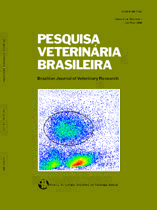 |
|
|
|
Year 2012 - Volume 32, Number 2
|

|
Microbiology of rectal and otologic swabs of wild carnivores from the Zoo of the Parque Estadual de Dois Irmãos, Pernambuco, Brazil, 32(2):159-164
|
ABSTRACT.- Lima D.C.V., Siqueira D.B., Mota R.A., Rameh-de-Albuquerque L.C., Souza S.D., Santos A.S. & Silva L.B.G. 2012. [Microbiology of rectal and otologic swabs of wild carnivores from the Zoo of the Parque Estadual de Dois Irmãos, Pernambuco, Brazil.] Microbiologia de swabs retais e otológicos em carnívoros silvestres do zoológico do Parque Estadual de Dois Irmãos, Pernambuco. Pesquisa Veterinária Brasileira 32(2):159-164. Laboratório de Doenças Infectocontagiosas, Departamento de Medicina Veterinária, Universidade Federal Rural de Pernambuco, Rua Dom Manuel de Medeiros s/n, Dois Irmãos, Recife, PE 52171-900, Brazil. E-mail: rinaldo.mota@hotmail.com
The epidemiological study of pathogens in wild populations in the environment in situ and ex situ is essential for implementation of prevention, control and monitoring of diseases and for development of public policies for public and animal health. The study was conducted at the Zoo of Parque Estadual de Dois Irmãos, Recife/PE, Brazil, from January to July 2011, where we collected anal and otological swabs from 29 Zoo’s captive wild carnivores. The analysis of the otological swabs showed that 1/29 (3.4%) were positive for Malassezia pachydermatis on direct examination. In the microbiological examination of otologic swabs we found mainly bacteriae of the genus Bacillus 16/29 (55.2%), followed by Staphylococcus 15/29 (51.7%), Escherichia coli 7/29 (24.1%), Streptobacillus 1/29 (3.4%), Micrococcus 1/29 (3.4%) and Klebsiella 1/29 (3.4%). Regarding the presumptive test for the genus Salmonella from rectal swabs, positive samples were observed in six foxes (Cerdocyon thous) and a raccoon (Procyon cancrivorus). The isolation of Salmonella spp. in C. thous and P. cancrivorus indicates risks to public health, especially for zoo professionals who work directly with these animals. This research reinforces the importance of establishing surveillance strategies aimed at prevention, control and monitoring of potential reservoirs of the etiologic agents of infectious and parasitic diseases in the environment of zoos. |
| |
|
|
| |
|
 |